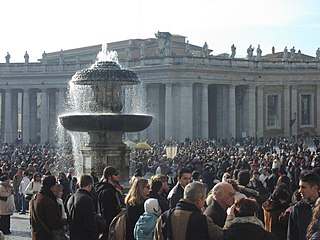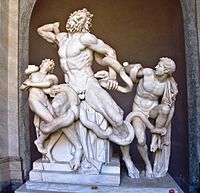The Roman Curia comprises the administrative institutions of the Holy See and the central body through which the affairs of the Roman Catholic Church are conducted. The Roman Curia is the institution which the Roman Pontiff ordinarily makes use of in the exercise of his supreme pastoral office and universal mission in the world. It is at the service of the Pope, successor of Peter, and of the Bishops, successors of the Apostles, according to the modalities that are proper to the nature of each one, fulfilling their function with an evangelical spirit, working for the good and at the service of communion, unity and edification of the Universal Church and attending to the demands of the world in which the Church is called to fulfill its mission.

A prelate is a high-ranking member of the Christian clergy who is an ordinary or who ranks in precedence with ordinaries. The word derives from the Latin praelatus, the past participle of praeferre, which means 'carry before', 'be set above or over' or 'prefer'; hence, a prelate is one set over others.

The Dicastery for the Clergy, formerly named Congregation for the Clergy, is the dicastery of the Roman Curia responsible for overseeing matters regarding priests and deacons not belonging to religious orders. The Congregation for the Clergy handles requests for dispensation from active priestly ministry, as well as the legislation governing presbyteral councils and other organisations of priests around the world. The Congregation does not deal with clerical sexual abuse cases, as those are handled exclusively by the Congregation for the Doctrine of the Faith.
Ecclesia Dei is the document Pope John Paul II issued on 2 July 1988 in reaction to the Ecône consecrations, in which four priests of the Society of Saint Pius X were ordained as bishops despite an express prohibition by the Holy See. The consecrating bishop and the four priests consecrated were excommunicated. John Paul called for unity and established the Pontifical Commission Ecclesia Dei to foster a dialogue with those associated with the consecrations who hoped to maintain both loyalty to the papacy and their attachment to traditional liturgical forms.

The Congregation for Catholic Education (Institutes of Study) (Latin: Congregatio de Institutione Catholica (Studiorum Institutis)) was the pontifical congregation of the Roman Curia responsible for: universities, faculties, institutes and higher schools of study, either ecclesial or non-ecclesiastical dependent on ecclesial persons; and schools and educational institutes depending on ecclesiastical authorities.

The Dicastery for the Eastern Churches, previously named Congregation for the Oriental Churches or Congregation for the Eastern Churches, is a dicastery of the Roman Curia responsible for contact with the Eastern Catholic churches for the sake of assisting their development and protecting their rights. It also maintains whole and entire in the one Catholic Church the heritage and canon law of the various Eastern Catholic traditions. It has exclusive authority over the following regions: Egypt and the Sinai Peninsula, Eritrea and northern Ethiopia, southern Albania and Bulgaria, Cyprus, Greece, Iran, Iraq, Lebanon, Israel, Syria, Jordan and Turkey, and also oversees jurisdictions based in Romania, Southern Italy, Hungary, India and Ukraine.
The papal household or pontifical household, called until 1968 the Papal Court, consists of dignitaries who assist the pope in carrying out particular ceremonies of either a religious or a civil character.
The Pontifical Biblical Commission is a pontifical commission established within the Roman Curia to ensure the proper interpretation and defense of the Bible.
Pastor bonus is an apostolic constitution promulgated by Pope John Paul II on 28 June 1988. It instituted a number of reforms in the process of running the central government of the Catholic Church.
The Pontifical Council for the Pastoral Care of Migrants and Itinerant People was a pontifical council of the Roman Curia. The council, established by Pope John Paul II on 28 June 1988, was dedicated to the spiritual welfare of migrant and itinerant people.
The history of the Roman Curia, the administrative apparatus responsible for managing the affairs of the Holy See and the Catholic Church, can be traced to the 11th century when informal methods of administration began to take on a more organized structure and eventual a bureaucratic form. The Curia has undergone a series of renewals and reforms, including a major overhaul following the loss of the Papal States, which fundamentally altered the range and nature of the Curia's responsibilities, removing many of an entirely secular nature.
The ecclesiastical response to Catholic sexual abuse cases is a major aspect of the academic literature surrounding the Church's child sexual abuse scandal. The Catholic Church's response to the scandal can be viewed on three levels: the diocesan level, the episcopal conference level and the Vatican. Responses to the scandal proceeded at all three levels in parallel with the higher levels becoming progressively more involved as the gravity of the problem became more apparent.
Juan Ignacio Arrieta Ochoa de Chinchetru is a Spanish prelate of the Catholic Church who has been secretary of the Pontifical Council for Legislative Texts since 15 February 2007. A bishop since 2008, he has held several other appointments in the Roman Curia.
The Curial response to Catholic sexual abuse cases was a significant part of the Church's response to Catholic sexual abuse cases. Its policies have shifted from favoring secrecy in the 20th century to active reform and apologies in the 21st century. Under the current leadership of Pope Francis, the issue has been addressed through direct instructions to report cases of sexual abuse and revoking the former policies of secrecy.
The Pontifical Council for Promoting the New Evangelization, also translated as Pontifical Council for Promoting New Evangelization, was a pontifical council of the Roman Curia whose creation was announced by Pope Benedict XVI at vespers on 28 June 2010, eve of the Feast of Saints Peter and Paul, to carry out the New Evangelization. On 5 June 2022, the department was merged into the Dicastery for Evangelization.

Pontificalis Domus was a motu proprio document issued by Pope Paul VI on 28 March 1968, in the fifth year of his pontificate. It reorganized the Papal Household, which had been known until then as the Papal Court.

Catholic laity are the ordinary members of the Catholic Church who are neither clergy nor recipients of Holy Orders or vowed to life in a religious order or congregation. Their mission, according to the Second Vatican Council, is to "sanctify the world".
Vatican News is a Catholic news website provided by the Vatican's Dicastery for Communication that partners with Vatican Radio, L'Osservatore Romano, and Vatican Media to provide multimedia pertaining to the global Catholic Church and the operations of the Holy See.
The Pontifical Academy for Latin is an organization established in 2012 to promote appreciation for the Latin language and culture. The Academy replaced the Latinitas Foundation, which Pope Paul VI erected in 1976, and is linked to the Dicastery for Culture and Education on which it depends. Its headquarters is located in Vatican City.
The Dicastery for Culture and Education is an administrative unit of the Roman Curia. It began operations on 5 June 2022 as established by the apostolic constitution Praedicate evangelium promulgated on 19 March 2022. It was formed through the merger of two earlier bodies, the Pontifical Council for Culture and the Congregation for Catholic Education.





